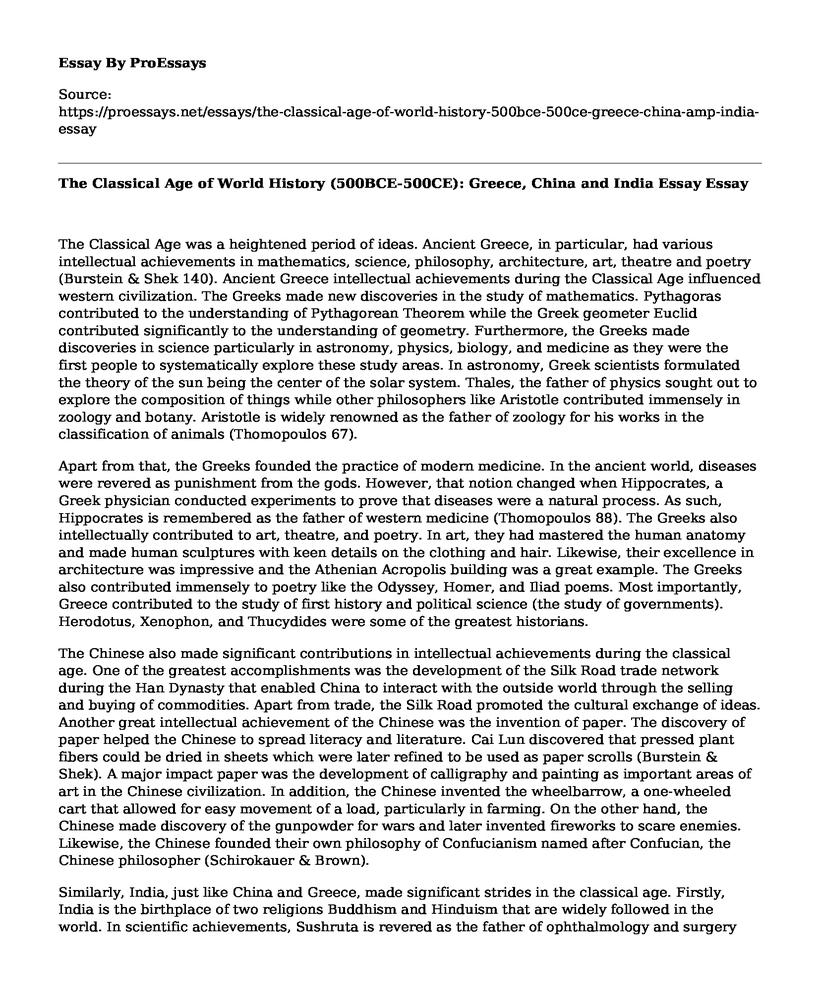The Classical Age was a heightened period of ideas. Ancient Greece, in particular, had various intellectual achievements in mathematics, science, philosophy, architecture, art, theatre and poetry (Burstein & Shek 140). Ancient Greece intellectual achievements during the Classical Age influenced western civilization. The Greeks made new discoveries in the study of mathematics. Pythagoras contributed to the understanding of Pythagorean Theorem while the Greek geometer Euclid contributed significantly to the understanding of geometry. Furthermore, the Greeks made discoveries in science particularly in astronomy, physics, biology, and medicine as they were the first people to systematically explore these study areas. In astronomy, Greek scientists formulated the theory of the sun being the center of the solar system. Thales, the father of physics sought out to explore the composition of things while other philosophers like Aristotle contributed immensely in zoology and botany. Aristotle is widely renowned as the father of zoology for his works in the classification of animals (Thomopoulos 67).
Apart from that, the Greeks founded the practice of modern medicine. In the ancient world, diseases were revered as punishment from the gods. However, that notion changed when Hippocrates, a Greek physician conducted experiments to prove that diseases were a natural process. As such, Hippocrates is remembered as the father of western medicine (Thomopoulos 88). The Greeks also intellectually contributed to art, theatre, and poetry. In art, they had mastered the human anatomy and made human sculptures with keen details on the clothing and hair. Likewise, their excellence in architecture was impressive and the Athenian Acropolis building was a great example. The Greeks also contributed immensely to poetry like the Odyssey, Homer, and Iliad poems. Most importantly, Greece contributed to the study of first history and political science (the study of governments). Herodotus, Xenophon, and Thucydides were some of the greatest historians.
The Chinese also made significant contributions in intellectual achievements during the classical age. One of the greatest accomplishments was the development of the Silk Road trade network during the Han Dynasty that enabled China to interact with the outside world through the selling and buying of commodities. Apart from trade, the Silk Road promoted the cultural exchange of ideas. Another great intellectual achievement of the Chinese was the invention of paper. The discovery of paper helped the Chinese to spread literacy and literature. Cai Lun discovered that pressed plant fibers could be dried in sheets which were later refined to be used as paper scrolls (Burstein & Shek). A major impact paper was the development of calligraphy and painting as important areas of art in the Chinese civilization. In addition, the Chinese invented the wheelbarrow, a one-wheeled cart that allowed for easy movement of a load, particularly in farming. On the other hand, the Chinese made discovery of the gunpowder for wars and later invented fireworks to scare enemies. Likewise, the Chinese founded their own philosophy of Confucianism named after Confucian, the Chinese philosopher (Schirokauer & Brown).
Similarly, India, just like China and Greece, made significant strides in the classical age. Firstly, India is the birthplace of two religions Buddhism and Hinduism that are widely followed in the world. In scientific achievements, Sushruta is revered as the father of ophthalmology and surgery because he carried out complicated surgeries on people with eye cataracts (Eraly 98). Brahmagupta discovered the use of the algorithm in mathematics which became the numbering scheme (Eraly). As such, the notion of zero as a number is an Indian invention. In games and sports, the Indians invented Ashtapada, a board game that is now known as chess. Similarly, the Indians discovered yoga, a physical exercise aimed at improving blood circulation and overall body fitness (Eraly 201). Yoga has become a popular exercise for meditation among other benefits in the modern world.
Conclusion
In conclusion, the Greeks, Chinese, and Indians made various important intellectual achievements in the classical age. The three civilizations have common achievements in the areas of astronomy, mathematics, and science. Likewise, the Indians and Greeks participated in ancient sports namely chess and Olympic Games respectively, a common feature in the two civilizations. The Greeks achievements had the greatest impact upon the western civilization because of their inventions in all spheres of life that have been adopted across the world in education and application. Likewise, the Chinese invention of paper is fundamental in the world today even in the digital age.
Works Cited
Burstein, Stanley M, and Richard H.-C. Shek. World History. Houghton Mifflin Harcourt, 2012.
Eraly, Abraham. The First Spring: The Golden Age of India. Viking, Penguin Books India, 2011.
Schirokauer, Conrad, and Miranda Brown. A Brief History of Chinese Civilization. Wadsworth Publishing, 2013.
Thomopoulos, Elaine. The History of Greece. Greenwood, 2012.
Cite this page
The Classical Age of World History (500BCE-500CE): Greece, China and India Essay. (2022, Sep 26). Retrieved from https://proessays.net/essays/the-classical-age-of-world-history-500bce-500ce-greece-china-amp-india-essay
If you are the original author of this essay and no longer wish to have it published on the ProEssays website, please click below to request its removal:
- Paper Example on DACA: Immigration Past, Present and Future
- Middle Passage Essay Example
- Essay Example on Globalization and Devolution: Impact on US Federalism
- Essay Sample on WWII Tech Advances: Post-War Benefits for Health & Beyond
- Essay Example on Jennifer Doudna: Pioneering CRISPR-Cas9 Genome Engineering Expert
- Essay Example on Troy Maxson: A Man of Strength, Hard Work, and Imagination
- Essay Example on Uncovering the Mystery of Ancient Cahokia: The Lost City of Mississippi







